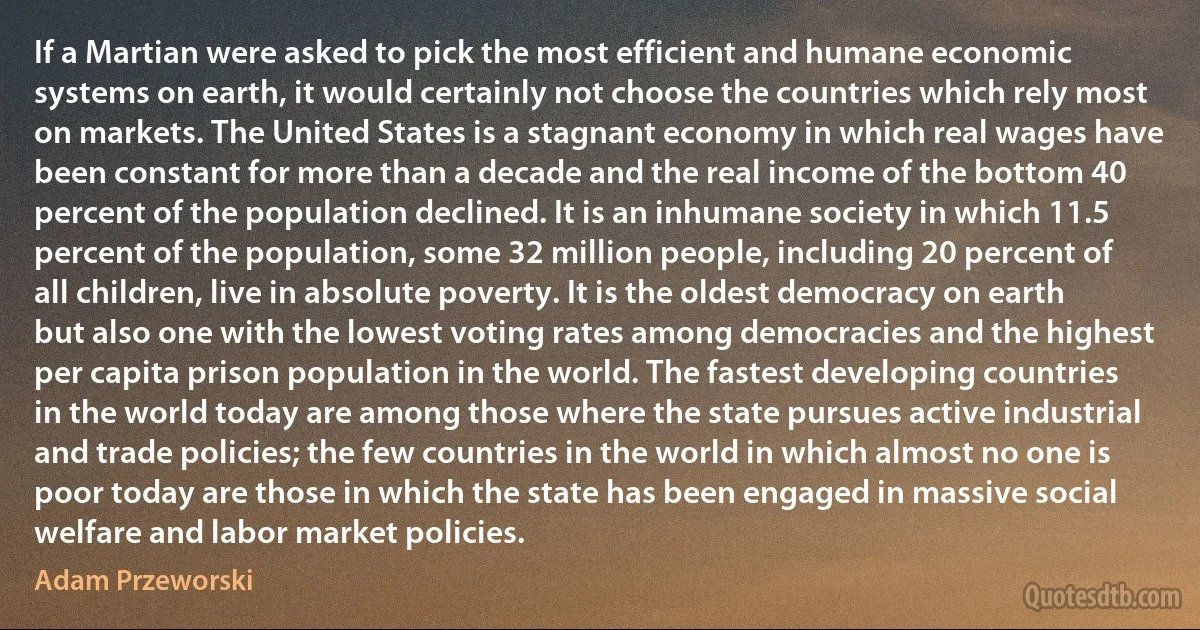
If a Martian were asked to pick the most efficient and humane economic systems on earth, it would certainly not choose the countries which rely most on markets. The United States is a stagnant economy in which real wages have been constant for more than a decade and the real income of the bottom 40 percent of the population declined. It is an inhumane society in which 11.5 percent of the population, some 32 million people, including 20 percent of all children, live in absolute poverty. It is the oldest democracy on earth but also one with the lowest voting rates among democracies and the highest per capita prison population in the world. The fastest developing countries in the world today are among those where the state pursues active industrial and trade policies; the few countries in the world in which almost no one is poor today are those in which the state has been engaged in massive social welfare and labor market policies.
Adam PrzeworskiRelated topics
almost bottom caput children choose constant developing earth few industrial labor live market people pick poor poverty prison real state trade voting wages world today martian StatesRelated quotes
I would summarize the Keynesian view in terms of four points:1. Economies sometimes produce much less than they could, and employ many fewer workers than they should, because there just isn't enough spending. Such episodes can happen for a variety of reasons; the question is how to respond.
2. There are normally forces that tend to push the economy back toward full employment. But they work slowly; a hands-off policy toward depressed economies means accepting a long, unnecessary period of pain.
3. It is often possible to drastically shorten this period of pain and greatly reduce the human and financial losses by "printing money”, using the central bank's power of currency creation to push interest rates down.
4. Sometimes, however, monetary policy loses its effectiveness, especially when rates are close to zero. In that case temporary deficit spending can provide a useful boost. And conversely, fiscal austerity in a depressed economy imposes large economic losses.

Paul Krugman
I suspect that many of the world's financial lords are somewhat embarrassed to tell Japan repeatedly at G-7 meetings and elsewhere to adopt a Keynesian solution. Within Europe, central banks and governments think Keynesian theories and policies are absolutely wrong. Despite the remarkable success of pragmatic policies in the United States, true believers in the Invisible Hand reject Keynesian diagnoses and prescriptions. Many observers of Japan have found it intellectually comforting to blame the slump on the plight of the banks, flooded with bad loans dated from the land and equity bubbles and their collapse. They hope that a governmentmanaged and -subsidized rectification of bank balance sheets will trigger overall economic recovery. I think this is a false hope. The bank problem is only a small part of the macroeconomic disaster. It has to be resolved, of course, but resolution that is no substitute for the needed fiscal and monetary stimuli.

James Tobin
The old form of trade union, which was born in the nineteenth century and aimed primarily at negotiating wages for a specific trase is no longer sufficient. First of all, as we have been argueing, the old trade unions are not able to represent the unemployed, the poor, or even the mobile and flexible post-Fordist workers with short term contracts, all of whom participate actively in social production and increase social wealth. Second, the old unions are divided according to the various products and tasks defined in the heyday of industrial production - a miners' union, a pipefitters' union, a machinists' union and so forth. Today, insofar as the conditions and the relations of labor are becoming common, these traditional divisions (or even newly defined divisions) no longer make sense and serve only as an obstacle. Finally the old unions have become purely economic, not political, organization.

Antonio Negri
The theories that I (and others) helped develop explained why unfettered markets often not only do not lead to social justice, but do not even produce efficient outcomes. Interestingly, there has been no intellectual challenge to the refutation of Adam Smith's invisible hand: individuals and firms, in the pursuit of their self-interest, are not necessarily, or in general, led as if by an invisible hand, to economic efficiency. The only question that has been raised concerns the ability of government to remedy the deficiencies of the market. Within academia, a significant fraction of economists are involved with developing and expanding on the ideas of imperfect information (and imperfect markets) that I explored. For instance, Edmund Phelps, this year's Nobel Prize winner, belongs to this "school" of thought. But in political discourse, simplistic "market fundamentalism” continues to exert enormous influence.

Joseph Stiglitz
In order better to grasp the thought of Malthus, let us translate it into philosophical propositions by stripping it of its rhetorical gloss: -
"'"Individual liberty, and property, which is its expression, are economical data; equality and solidarity are not."
"Under this system, each one by himself, each one for himself: labor, like all merchandise, is subject to fluctuation: hence the risks of the proletariat."
"Whoever has neither income nor wages has no right to demand anything of others: his misfortune falls on his own head; in the game of fortune, luck has been against him."
From the point of view of political economy these propositions are irrefutable; and Malthus, who has formulated them with such alarming exactness, is secure against all reproach. From the point of view of the conditions of social science, these same propositions are radically false, and even contradictory.

Pierre-Joseph Proudhon
